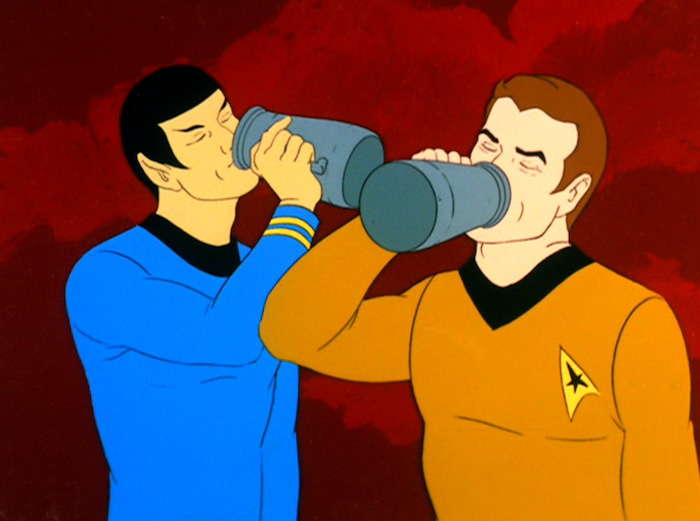Star Trek Animated Series
Original air dates: September 1973 – October 1974
Executive Producers: Lou Scheimer & Norm Prescott
Captain’s log. With Star Trek continuing to be popular in reruns, and with James Blish‘s adaptations of the live-action episodes proving very popular in prose (with Blish also commissioned to write an original novel Spock Must Die! which would be the first of several published by Bantam throughout the 1970s), Filmation picked up the rights to do new Trek in animation.
Unlike most of Filmation’s other efforts, the show was deliberately produced as being more adult—still watchable by kids, of course, like the stuff airing around it on Saturday morning, but also something to be enjoyed by the same adults who watched the live-action series several years previous. To that end, both D.C. Fontana and creator Gene Roddenberry were heavily involved in the development of the show. Most of the show’s writers were either veterans of the live-action series (Samuel A. Peeples, Margaret Armen, David Gerrold, Stephen Kandel, Paul Schneider, David P. Harmon, and Fontana herself) or new writers who still had strong knowledge of the franchise (Marc Daniels, Walter Koenig, Howard Weinstein, and “John Culver,” a.k.a. Fred Bronson), plus maintaining the live-action series’ tradition of bringing in science fiction writers (Larry Niven). The show also did many sequels and continuations of live-action episodes.
The show was successful enough to commission a short second season—which was SOP for animated series of the era, which would rarely go beyond their single episode order and if they did, it would only be for a few to pepper in among the endless reruns of the first season—and while Roddenberry himself would later disavow it and try to pretend it didn’t happen, the show did have a certain influence. The holodeck seen in TNG was first seen on the animated series in “The Practical Joker‘s” rec deck, and “Yesteryear” and “The Time Trap” would both later be cited on TNG and DS9, respectively.
Highest-rated episode: “The Slaver Weapon” and “The Pirates of Orion,” both with a 9. Both by guys best known for their novels, too…
Lowest-rated episode: Another tie, between “The Magicks of Megas-Tu” and “The Counter-Clock Incident,” which both got a 2.
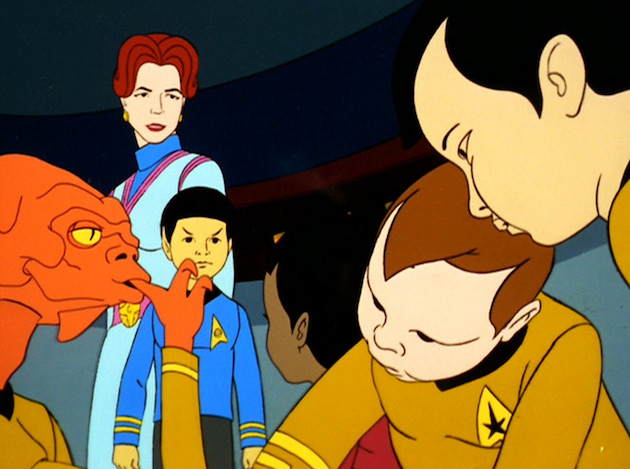
Most comments (as of this writing): “The Slaver Weapon,” with 90. This is the first time the TOS Rewatch hasn’t had a season with at least one three-figure comment episodes. Ah, well. Maybe ten more people will comment soon…
Fewest comments (as of this writing): “The Pirates of Orion” with a mere 26. One of the best episodes of the animated series, and this is all the love it gets? Sheesh.
Favorite Can’t we just reverse the polarity? From “The Eye of the Beholder“: Spock says the communicator signal is 1.1 kilometers away, but Scotty later says the city (where the signal originated) is 98.5 kilometers away. Scotty also reports that the city is to the northeast, but the Lactrans take the landing party northwest to the city. Nice to see D.C. Fontana was putting that script editor title to good use…
Favorite Fascinating. From “The Survivor“: Spock doesn’t notice that there’s a third biobed in sickbay until after Kirk points it out. Spock then lamely says, “I was just going to point that out myself.” Yeah, suuuuuure, we believe you, Mr. Observant Pants.
Favorite I’m a doctor not an escalator. From “Once Upon a Planet“: McCoy gets to revisit his first trip to the planet by summoning Alice and the White Rabbit, then almost gets his head cut off, fakes Spock’s death, and gets chased by pterodactyls, giant cats, and a two-headed dragon. Busy episode…
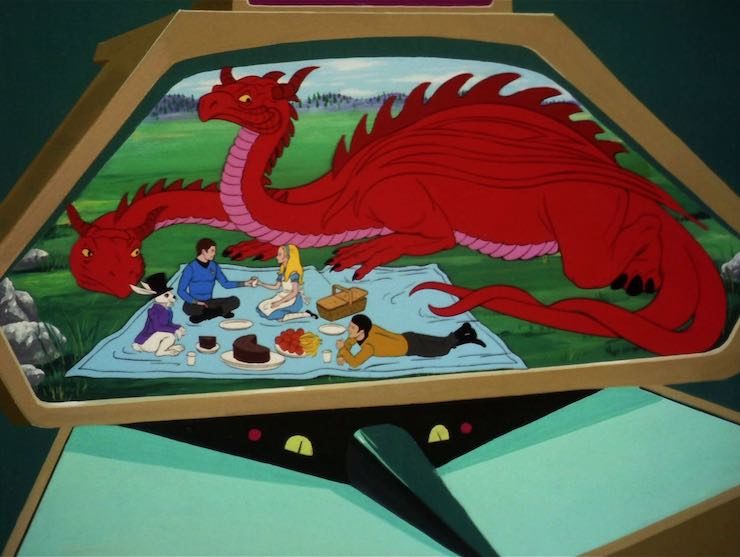
Favorite Ahead warp one, aye. From “The Magicks of Megas-Tu”: Sulu uses the magic of the center of the galaxy to create a woman. Uhura says, “Good luck,” but then Lucien interrupts before anything can happen. It’s not clear if this is Sulu’s one true love, his mother, his sister, the grown-up version of his daughter, some random chick he saw on a ferry once, or what.
Favorite Hailing frequencies open. From “The Lorelei Signal“: Uhura realizes right away something’s up, and takes all the right steps—getting Chapel to confirm her suspicions, not taking command until she’s verified what’s happening scientifically, and then kicking ass and taking names when she beams down.
It’s not clear why she needed Spock to tell her to send a security team down, though…
Favorite I cannot change the laws of physics! From “The Lorelei Signal”: While in command of the ship, and under the influence of Theela and her gang, Scotty decides to start singing “Yr Hufen Melyn” (“The Yellow Cream”) by Eifion Wyn. It’s a Welsh ballad, which is surprising coming from the Scotsman, but whatever. It’s certainly grounds for being relieved of command, and at least it sounds nicer than “I’ll Take You Home Again, Kathleen” or “Heart of Oak” or “Maiden Wine.”
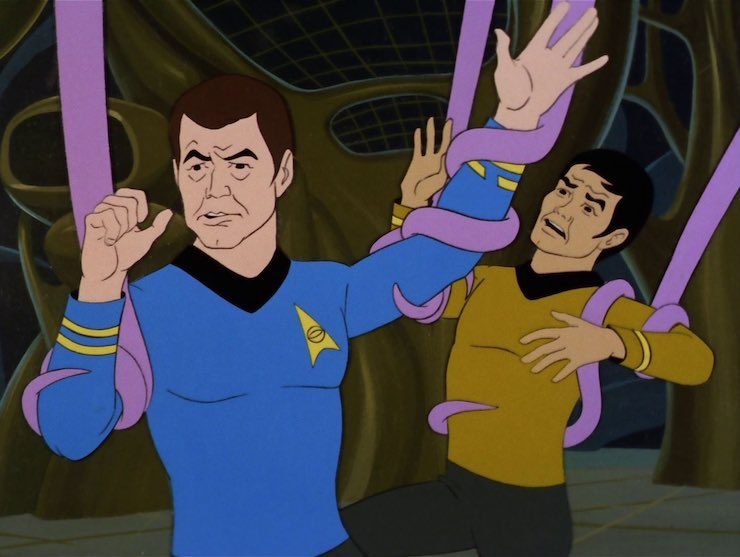
Favorite It’s a Russian invention. From “The Infinite Vulcan“: While Filmation couldn’t afford to hire Walter Koenig to reprise the voice of Chekov (they could barely afford Nichelle Nichols and George Takei), as a make-good, they hired him to write an episode. In fact, he’d been approached to do so independently of his exclusion from the cast due to Susan Sackett, Gene Roddenberry’s personal assistant, typing up a screenplay of Koenig’s and her showing it to Roddenberry, who was impressed enough to offer him a gig writing for the animated series. However, he had to do multiple rewrites, which soured him on the whole experience, and when he was asked to write another, he declined the offer.
Favorite Forewarned is three-armed. From “The Pirates of Orion”: Arex is the one who recognizes the ship as Orion, and he’s the one who tracks the ship down.
Favorite Go put on a red shirt. From “More Tribbles, More Troubles“: The security guard in the transporter room whom Kirk asks to secure the room once tribbles show up on board is modeled after writer David Gerrold.
Favorite No sex, please, we’re Starfleet: From “Mudd’s Passion“: Chapel’s unrequited love for Spock leads her to try the love potion on Spock. It does not go well for either of them. Meanwhile, M’Ress hits on Scotty and McCoy hits on an unidentified crewwoman.
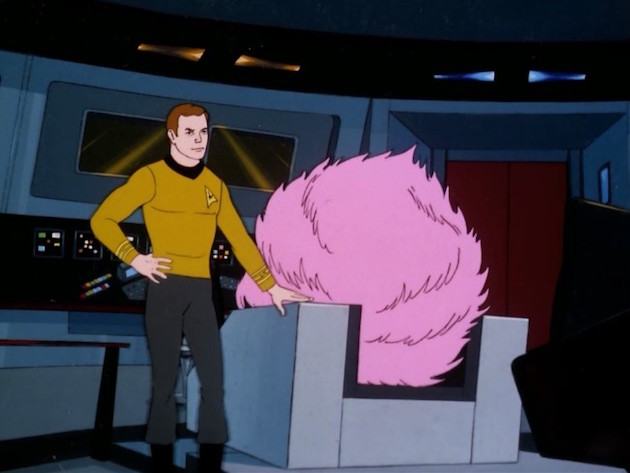
Favorite Channel open. From “More Tribbles, More Troubles”:
“Tribbles are well known for their proclivities in multiplication.”
“And they breed fast, too!”
–Spock describing tribbles and Jones failing his saving throw versus linguistic comprehension.
Favorite Welcome aboard. As a money-saver, most of the voices that weren’t the regulars were still done by the regulars. Majel Barrett, James Doohan, and Nichelle Nichols provided most of the secondary voices, with voiceover actors filling in here and there, from Lennie Weinrib to Lou Scheimer to Ted Knight to Jane Webb.
It is notable, therefore, to single out the three other actors they actually got back to voice their characters: Mark Lenard as Sarek in “Yesteryear,” Stanley Adams as Jones in “More Tribbles, More Troubles,” and Roger C. Carmel as Mudd in “Mudd’s Passion.”
Favorite Trivial matters: The one for “The Time Trap,” as that episode was impressively influential on a number of future episodes.
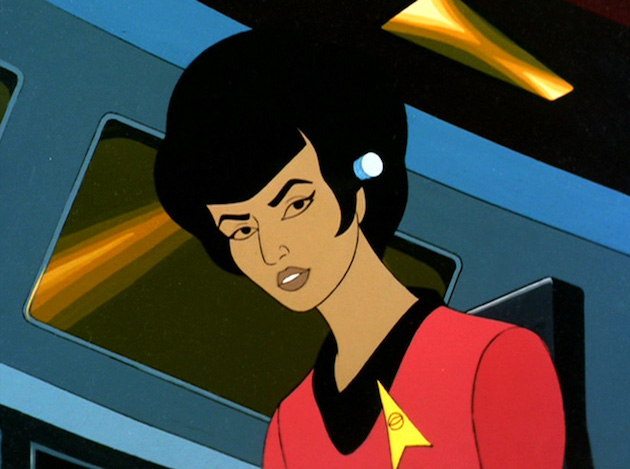
To boldly go. “Emotional Earther!” The animated series had a lot riding against it. One of the biggest is the limitations of animation, both in terms of the sophistication level of Filmation’s work and more generally in terms of the perception of animation as kiddie fare. That perception was not entirely unjustified at the time—the sophisticated cartoons of Warner Bros. and Disney that went before movies (or were movies) had given way to companies like Filmation and Hanna Barbera cranking out mid-level pablum that didn’t require much by way of thinking.
But Trek was a deliberate throwback to those thrilling days of yesteryear when animation wasn’t synonymous with doofy—or, perhaps, a forerunner to the 1990s animation revolution that we’re still enjoying now.
Sadly, they weren’t always able to manage it. For every “Yesteryear” and “The Pirates of Orion” and “The Slaver Weapon” that was able to do a certain amount of complex storytelling, for every “Jihad” and “The Survivor” and “One of Our Planets is Missing” that tells a solid story, there’s junk like “The Counter-Clock Incident” and “The Practical Joker” and “The Lorelei Signal” and “The Magicks of Megas-Tu” and “Mudd’s Passion.”
Still, it was overall a noble experiment. The successes justified the failures, and even the latter had their moments (like Scotty’s pie in the face or Kirk putting his arm around Spock and blithely stating, “My dear friend Spock”).
Best of all, the series enabled Trek to get a bit more alien in its landscapes and creatures, going even further than they went in the third season, where they were heavily constrained by budget. (Though, of course, that was half the reason why they went more alien in season three, but whatever.) It was worth it to give us more far-out crew members like Arex and M’Ress and nifty non-humanoid aliens. Plus, the animated series did something neither the live-action TV series or the movies had the balls to do: put Uhura in charge of the ship, not once, but twice!
Warp factor rating for the season: 6
Next week: Star Trek: The Motion Picture
Keith R.A. DeCandido has two works coming out this month: the novel Marvel’s Warriors Three: Godhood’s End, Book 3 of the “Tales of Asgard” trilogy, available for preorder from Joe Books; and the short story “Behind the Wheel” in TV Gods: Summer Programming, which will launch at Balticon 51 over Memorial Day weekend from Fortress Publishing.










